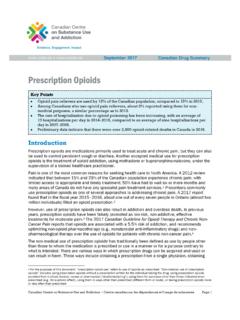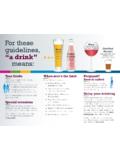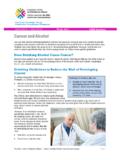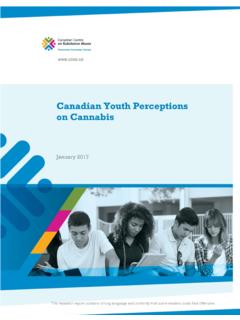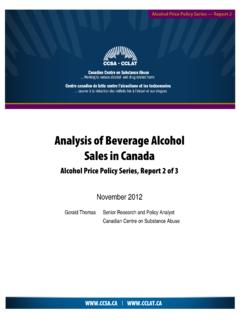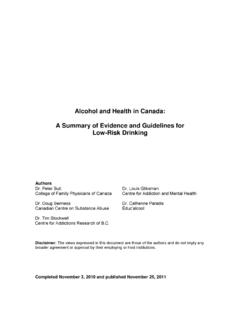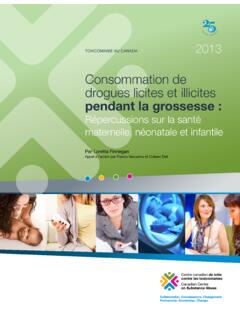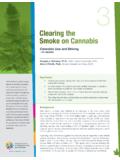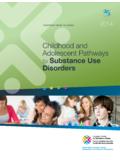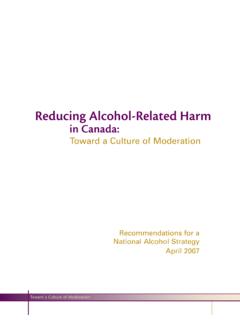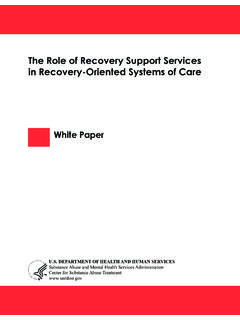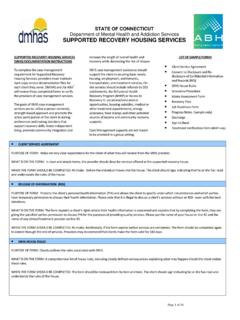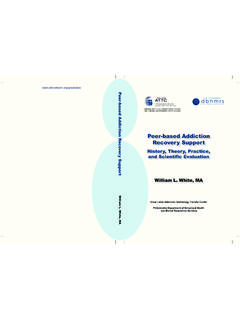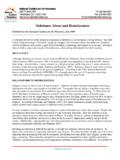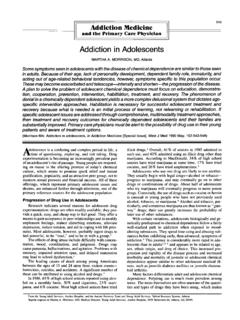Transcription of Life in Recovery from Addiction in Canada …
1 life in Recovery from Addiction in Canada Technical Report May 2017. Robyn McQuaid, PhD Natalie Baydack, MA, CE. Research and Policy Analyst, Canadian Partner PRA Inc. Centre on Substance Use and Addiction Matthew Stargardter, MA. Aqsa Malik, PhD Senior Research Associate, PRA Inc. Knowledge Broker, Canadian Centre on Substance Use and Addiction Marcus Morrisey, PhD. Research Associate, PRA Inc. Kate Moussouni, MA. National Priority Advisor, Canadian Centre on Substance Use and Addiction life in Recovery from Addiction in Canada This document was published by the Canadian Centre on Substance Use and Addiction (CCSA). Suggested citation: McQuaid, , Malik, A., Moussouni, K., Baydack, N., Stargardter, M., &. Morrisey, M. (2017). life in Recovery from Addiction in Canada . Ottawa, Ont.: Canadian Centre on Substance Use and Addiction . Canadian Centre on Substance Use and Addiction , 2017.
2 CCSA, 500 75 Albert Street Ottawa, ON K1P 5E7. Tel.: 613-235-4048. Email: Production of this document has been made possible through a financial contribution from Health Canada . The views expressed herein do not necessarily represent the views of Health Canada . This document can also be downloaded as a PDF at Ce document est galement disponible en fran ais sous le titre : La vie en r tablissement de la toxicomanie au Canada ISBN 978-1-77178-407-8. life in Recovery from Addiction in Canada : Technical Report Table of Contents Executive Summary .. 1. Introduction .. 4. Method .. 5. Development of Survey .. 5. Pilot Test .. 5. Recruitment Strategy .. 5. Data Analysis .. 6. 7. Participants .. 7. Health and Quality of life .. 10. Current Quality of 10. Substance Use and Mental Health .. 10. Physical Health .. 11. Substance Use .. 12. Age at First Drug Use and Addiction .
3 12. Substances 13. Recovery .. 15. Definitions of Recovery .. 15. Factors in Starting and Maintaining Recovery .. 17. Barriers to Recovery .. 19. Relapse .. 20. Recovery Resources, Programs and Supports .. 20. Recovery Resources and Programs .. 20. Medication-Assisted Treatment .. 23. Recovery Supports .. 24. life Experiences during Addiction and Recovery .. 27. Family and Social 27. Health29. Legal Issues .. 30. Canadian Centre on Substance Use and Addiction Centre canadien sur les d pendances et l'usage de substances Canadian life in Recovery Survey Work and Study .. 31. Finances .. 32. International Context .. 33. Perceptions of Stigma and Discrimination .. 36. Other Significant life 39. Final Comments from Respondents .. 45. Discussion .. 45. References .. 48. Appendix A: Members of the National Recovery Advisory Committee .. 49. Appendix B: Members of the Recovery Expert Advisory Group.
4 50. Appendix C: Survey of life in Recovery from Addiction in Canada .. 51. Appendix D: Incomplete Surveys .. 79. Canadian Centre on Substance Use and Addiction Centre canadien sur les d pendances et l'usage de substances Canadian life in Recovery Survey Authorship Robyn J. McQuaid, PhD. Research and Policy Analyst, Canadian Centre on Substance Use and Addiction Aqsa Malik, PhD. Knowledge Broker, Canadian Centre on Substance Use and Addiction Kate Moussouni, MA. National Priority Advisor, Canadian Centre on Substance Use and Addiction Natalie Baydack, MA, CE. Partner PRA Inc. Matthew Stargardter, MA. Senior Research Associate, PRA Inc. Marcus Morrisey, PhD. Research Associate, PRA Inc. Acknowledgements CCSA would like to thank everyone who participated in this study by completing the life in Recovery from Addiction in Canada survey. We would also like to thank the National Recovery Advisory Committee (Appendix A) and the Recovery Expert Advisory Group (Appendix B) for their guidance and support during all stages of this project.
5 We thank PRA Inc., which helped with the survey development and analyses of the report. Finally, we would also like to thank William L. White who peer reviewed the report. CCSA is grateful to the following organizations involved in conducting previous life in Recovery surveys in the United States, Australia, and the United Kingdom for granting permission to use their survey questionnaires as a starting point for the development of the Canadian survey: Faces and Voices of Recovery (FAVOR), Turning Point, Australia South Pacific Private, Australia Helena Kennedy Centre at Sheffield Hallam University, Conflicts of Interest None of the listed authors have any conflicts of interest to declare. Canadian Centre on Substance Use and Addiction Centre canadien sur les d pendances et l'usage de substances Canadian life in Recovery Survey Executive Summary It is becoming increasingly understood that Recovery from Addiction to alcohol and other drugs is a personal journey comprising many different pathways (Kaskutas et al.)
6 , 2014; Kelly & Hoeppner, 2015; Notley et al., 2015; White, 2007). In an effort to gain an understanding about the experiences of individuals in Recovery from Addiction , a number of countries have conducted life in Recovery (LIR). surveys, including the United States in 2012 (Laudet, 2013), Australia in 2014 (Turning Point et al., 2015) and the United Kingdom in 2015 (Best et al., 2015). Results from these surveys suggested that the transition from active Addiction to Recovery is associated with improvements across many areas of life affecting individuals, families and communities. In Canada , there was very little evidence about the experiences of individuals in Recovery from Addiction , so the Canadian Centre on Substance Use and Addiction (CCSA) together with our partners conducted the first ever nationwide survey of individuals in Recovery from Addiction in Canada .
7 The Canadian survey was informed by the previous LIR surveys, but adapted to reflect the Canadian context. Additional questions were added to the Canadian survey that had not been previously assessed. For example, the Canadian survey was the first to examine barriers to initiating and sustaining Recovery with the intent that this information could help identify issues related to treatment. The Canadian LIR survey also examined participants' perceptions of stigma and discrimination prior to initiating and during Recovery to assess how these issues, which could potentially impact individuals' Recovery journey, were perceived. The online survey was offered from April 18, 2016, to June 1, 2016, in English and French, and comprised both quantitative and qualitative questions. A. total of 855 participants who reported being in Recovery from Addiction completed the survey.
8 This LIR survey highlights individuals' personal journeys and stories of Addiction and Recovery . Analysis of the survey results led to some of the following key findings about Canadians in Recovery who completed the survey: Canadians in Recovery who were surveyed reported an early age for first substance use (median age of 13 years) and Addiction (median age of 18 years), which did not differ according to gender. Individuals surveyed reported many negative effects during Addiction on their health, finances, family and social life , work and study, as well as many more legal issues. Alcohol, reported by of participants, was the most common substance used during active Addiction . Moreover, alcohol was also the most common drug of choice during active Addiction used by of respondents. The majority of respondents in Recovery report having a positive quality of life , with rating their quality of life as either excellent, very good or good.
9 Respondents' definition of Recovery included abstinence, improved health, social connections and functioning, as well as enhanced quality of life . More than half of survey respondents ( ) achieved stable Recovery without experiencing a single relapse. Respondents used a variety of pathways to initiate and sustain Recovery , with many choosing a combination of family, professional and mutual support resources. Canadian Centre on Substance Use and Addiction Centre canadien sur les d pendances et l'usage de substances Page 1. Canadian life in Recovery Survey The factors respondents considered most important in initiating Recovery were 1) quality of life , ; 2) mental or emotional health, ; 3) marital, family or other relationships, ; and 4) physical health, The most common Recovery resources or programs used were 12-step mutual support groups ( ) and specialized Addiction treatment programs (ranging from of participants for residential treatment to 5% for First Nations Addiction treatment programs).
10 Of respondents reported barriers to initiating Recovery , with the most common barriers including: 1) not being ready or not believing the problem was serious enough; 2) being worried about others' perceptions of people in Recovery ; 3) not knowing where to go for help;. 4) lack of supportive social networks; and 5) long delays for treatment. of respondents identified system-related barriers to accessing treatment, including long delays for treatment, a lack of professional help for mental health or emotional problems, cost of Recovery services, a lack of programs or supports in their community, the quality of services in their community, and the lack of programs or supports that met their cultural needs or were in their preferred language. While the majority of participants reported barriers to initiating Recovery , did not report experiencing barriers to sustaining Recovery .
